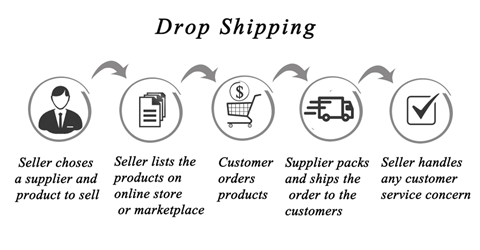
eCommerce dropshipping is a shipping fulfillment method. Merchants are not required to keep products in stock and still can complete orders to their customers.
The way it works is that you receive the order of the product and you redirect it to a third-party supplier so called the dropshipper. The dropshipper completes and ships the order to the customer.
A big percentage of merchants have the impression that dropshipping isn’t a profitable method for business. It seems like someone earns easy money because they sell products as middle agents and get a commission. For each sale, they go through their stores the supplier ships the order, but there are many problems, such as shipping delays and other time-related management issues that make you rethink if dropshipping isn’t so easy as it sounds.
However, with the right approach, you can organize the tasks while using strategies that are proven to assist you in starting a successful online business as well as taking advantage of dropshipping.
The Right Approach to Dropshipping
Dropshipping is the underdog method for businesses. Many believe that is just an extra cost for a successful online business because it has drawbacks which make it hard to support a business on its own but still, it offers enough benefits to companies that help them improve their business substantially.
The following four strategies will help your online business in dropshipping in the best way
1. Market research
Dropshipping can be used more efficiently as a tool which can give you feedback related to your marketing plans to strategize and implement. You can use it to test new products instead of keeping stock in your warehouse with unknown commodities. Thus, you can test and see for yourself some crucial points such as if a product has a high demand, how much can it be sold. Therefore you will have a better point of view for this new product and especially the quantity to get for your initial stock.
As a conclusion, it will help you minimize unwanted costs raising at your warehouse, and on the other hand, you can optimize your business with the most demanding products for your store. For example, if you sell for a long time successfully products regarding in-house decoration, will this be good to sell decoration outdoors too?
So if you are not sure about taking a risk, market research using eCommerce dropshipping will help lower the risk of loss.
2. Protection from overselling.
Many eCommerce businesses with long experience in the industry they are already aware that the market demands aren’t always predictable and they prefer not to increase inventory costs by overstocking to meet unlikely losses but have a dropshipping supplier as a backup who will save them money without losing any sales. This is especially useful for seasonal overflow, which makes dropshipping a defense mechanism for retailers that can be used to protect themselves from unexpected circumstances.
For example, if your warehouse gets on fire or is flooded, you can still fulfill orders by dropshipping the products from elsewhere. Also eCommerce dropshipping can be your backup warehouse, in cases that you face shipping delays which helps your business reputation to always look sharp to your customers.
3. Strategic shipping methods
A consequence of expanding your business is shipping costs. The further you get from your warehouse, the more shipping fees you’ll face at completing orders.
eCommerce dropshipping is the perfect solution for problematic locations that fall outside your profitable regions. You can test dropshipping for a small period and see if a new area has the potential to open a new store there.
4. High-maintenance products
Some products cost more to stock and ship them from your warehouse rather than to dropship them. In many cases, it may be more profitable for your business to dropship the order because it costs less to have them stored in your warehouse or fulfillment centers.
What do we mean by high-maintenance products?
Any products that require extra fees for storing or shipping, such as:
Large products
Some products take up so much space, and therefore the costs of having a big warehouse aren’t so profitable at the end.
Heavy products
If a product’s weight makes it cost too much to ship, by drop shipping from a manufacturer or wholesaler, it will be less cost for your business.
Fragile products
Fragile products need more preparation to ship them. So this is an opportunity for you to avoid all this trouble and the end-supplier who is more equipped than you finishes the order.
Valuables
High-value items like fine jewelry, antiques, collectibles, etc., require additional security that not all warehouses can offer. Rather than risking theft, the storage of these products is better to leave them at suppliers who have high-security warehouses.
Special conditions
For example frozen products, or products that need special care like sensitive to light. It might be best for you to drop ship the order of these products instead of requiring a particular warehouse for these items.
Unless your entire company specializes in these types of products, it is not necessary to have extra storage and pay additional shipping fees for a small subsection of your business, but you can still keep your customers satisfied by offering these products with dropshipping.
The Benefits of Dropshipping in a flash
You may consider eCommerce drop shipping for many reasons but here are the most important ones:
- Starting low costs
With dropshipping is so easy to start an online store. Your store doesn’t need to have a lot of stock, plus you still offer thousands of items to your customers - Convenience and efficiency
Running an eCommerce business is time-consuming, and a lot of work is needed to be successful. You don’t have to worry about order fulfillment which makes it a lot more convenient, and this will save you free time so you can implement other strategies for your business, e.g., operations, advertising, etc - Mobility
You can operate your business anywhere you have access to an internet connection because the third party supplier does all physical fulfillment



